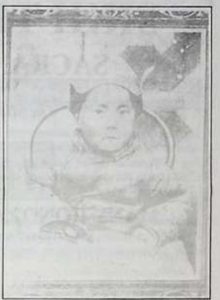
By Walter Goodman
N.Y: Despite its overly reverent tone, “Compassion in Exile” is an engaging portrait of Tenzin Gyatso, the Dalai Lama of Tibet, who has been in exile in India since 1959, when he fled Chinese Repression.
The hour long documentary, on the “P.O.V.” series on many PBS Stations, deftly combines glimpses of this Buddhist leader as a boy in Tibet with scenes of the man in exile receiving Tibetan refugees and performing picturesque ceremonies. He tells of his people’s afflictions, his pleasure in repairing watches and his dreams of a monastic life.
With his ready laugh, usually at himself, the Dalai Lama seems far more sophisticated than his interviewer and the program’s maker, Mickey Lemle.
But the Dalai Lama’s laughter dies away when he speaks of the cruelties his people have endured at the hands of the Chinese, who, he said, are trying to carry out the final solution of Tibetan culture, His charges are documented by newsreel scenes of Chinese crackdowns on Tibetan nationalists and refugees’ affecting accounts of rape, torture and long imprisonment. Although the Dalai Lama, who was awarded the Nobel Peace Prize in 1989, is seen receiving a healthy round of applause from Congress on his visit to Washington in 1991, Lemle notes that the West is reluctant to challenge China’s activities in Tibet, considered by the United States to be an autonomous region of China. A State Department official tells Lemle that Washington has no evidence of any policy of genocide by the Chinese. Asked about America’s view of Tibetans” rights to self-determination, he seems embarrassed.
The hour ends with the 58yearold Dalai Lama wishfully speaking of going to an isolated place to prepare for his “last days,” But having been proclaimed the reincarnation of the preceding Dalai Lama, today he finds himself the incarnation of his people’s struggle for their way of life. A monastic existence does not seem to be in his future.
Article extracted from this publication >> July 23, 1993